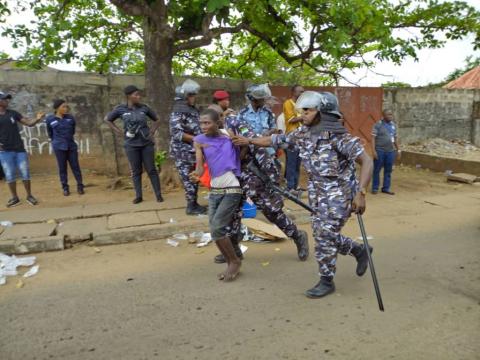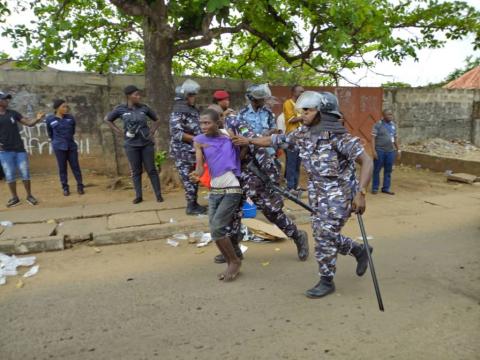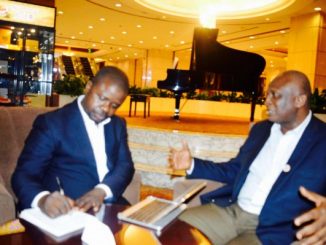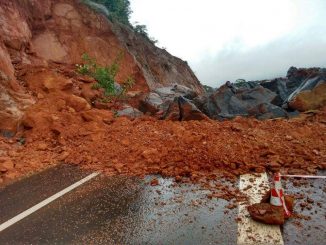
By Umaru Fofana
The events of Friday 31 May at the headquarters of the opposition All People’s Congress (APC) party have brought under scrutiny yet again the Sierra Leone Police (SLP). It is an outfit which some love to hate or hate to love often depending on their personal interests. It is both one of the most disciplined and one of the most reckless police forces in Africa, largely depending on which side of the political divide someone stands. But how do we turn things around not least because there is nothing new in all this?
Lately I have been going through my archives to listen to audios and read scripts of some of the events I have covered in Sierra Leone since I became a journalist some 23 odd years ago. If I needed it, they have reminded me that the issues in my homeland are so samey that I can reuse some of my old scripts to report on events of today. It’s just a matter of changing the numbers and dates and they will sound just true. I can even say the same for some of the things that happened when I was in diapers.
As I stood in front of the red-and-white building of the APC, I saw police deliberately aiming shots at a building with hundreds of people holed up inside. The police were clearly hyper. And they were brutal too. Some took up commando positions as if they were fighting dangerous criminals, as they kept raining teargas into the building. They bundled dozens of suspects in very brutal ways and crash-landed them inside waiting trucks and pick-up vans. Among them women some of whom looked meek and obviously posed no threat to the arresting policemen or broader society. Their dresses were torn and some left seriously injured in the process.
As I absorbed the shock of such cheer police brutality, my mind cast back on similar events of many years ago. It was on Sierra Leone’s Independence Day (27 April). The then opposition Sierra Leone People’s Party said they had applied for a permit to celebrate the national day by dancing with their mask devil on the streets – Yeri Wutehteh. The police would have none of it. The then ruling APC party had their own mask devil on the street, unhindered. The police said the opposition had not met the deadline to be allowed to come out. My investigations at the time showed that was not true. Again I saw brutality on that day unleashed by the police on unarmed civilians: same commando position-taking, same pumping of teargas into the SLPP headquarters, same inhuman bundling of suspects including women who would have been arrested in more civil ways.
Those who were condemnatory of the police then, are complimentary of them today. And those who said then that they were only doing their constitutional role, now say they are a terror. You see why I say I can use my old scripts today and only interchange or reverse the actors!?
Now in all this, no one seems interested in fixing our broken police force. Like the loathsome criminal libel law which is hated or liked by politicians depending on whether or not they are in power, the police force has been kept the way it is because those in power at various times have no interest in shaping it for the general good of society, rather for themselves. We missed a golden opportunity under President Ernest Bai Koroma to fix it. And here is why:
Under our laws, the country’s Vice President is the head of the Police Council. The Minister of Internal Affairs is the Secretary to the Council. And the Council is so powerful that it determines even promotions within the force from the rank of Assistant Superintendent of Police upwards. So effectively it means official political control of the police by politicians in power. No one felt that more than Ernest Bai Koroma in 2007 because he ran against an incumbent vice president, Solomon Berewa.
Such was how much he felt the heat that during a runoff election campaign in Bo in August 2007, Koroma said that if he won the election he would ensure the country’s vice president ceased being head of the Police Council. Win he did. Change the law he did not.
A day after he had been sworn in on 4 April last year, I interviewed President Julius Maada Bio at the Radisson Hotel, his temporary office. Hours following the announcement of the result, there had been clashes between supporters of the two main political parties. The now opposition APC accused the police of heavy-handedness in those clashes. When I put that to the new president, much as he expressed sympathy that some citizens had been injured, he underscored the point that he had just inherited the police left behind by the APC. I don’t think he wants to leave the same police force behind.
However long it takes, the SLPP are bound to be out of power some day. To fix the mess, the reformation of the police force must be a matter of urgency. The good behaviour of our constabulary when it comes to policing especially politically-related situations should not be at the magnanimity of a sitting president. It should be by law and structure of the force.
President Ahmad Tejan Kabbah embarked on many institutional reforms just after the end of the war in 2002. They included the police force. To ensure this he brought in a British officer, Keith Biddle to head the police. That led to structures like the CDIID which receives complaints from the public against serving police personnel, the FSU which specialises in dealing with domestic violence and other sexual offence matters, etc. In fact, it was Biddle who more or less appointed Brima Acha Kamara as head of the police, because President Kabbah simply endorsed his recommendation. Not anybody would have abided by that.
Those reforms did not solve all the problems of the police but they were a very good start. Building on them was apparently discarded after Kabbah and things took a nosedive.
There is still time now to try to right the wrongs. The best time for a president to carry out bold reforms is in the first two years of their presidency. The legitimate political control of the police must end by scrapping the control the vice president and the minister of internal affairs have over it. The force should be insulated in such a way that dismissing the head of the police should be made so difficult that it almost becomes impossible.
The ease with which the president can hire and fire the Inspector General of Police and his deputy is unhelpful, not least in a country where jobs are few and far between. The IG and his assistant would always be thinking of what to do if they faced the sack which would be inevitable if they did something the president and those around him didn’t take kindly to. We have seen it in the past. An IG went into a meeting with the UN team in the country, in the aftermath of a brutal police raid on the opposition offices. In the meeting he assured the world body representatives here of honest policing then on. A few days later he was sacked, apparently because of that assurance.
We have also seen here where the IG and his deputy were sacked – or “retired” – on the same day as if they had the same birthday. Both men were inherited and for some strange reason the new president didn’t see the deputy as being worthy of ascending to the top because he might not be a yes man.
The police should also be decentralised. This idea of the IG sending and recalling his regional commanders at will makes it difficult for them to do proper policing in their deployment area if their boss doesn’t wish them to. I don’t think anyone paid attention to how many times Kono District, especially the Tankoro Division, changed LUCs in the last five years of Koroma’s presidency. Almost innumerable!
Many senior police officers who clamped down on the opposition SLPP were transferred to far-flung areas regarded as punishment areas. Transfer should be a routine thing, and not a way of compensating or punishing people. It can only be the way it should be if some autonomy is given to regional commanders. And that can only happen if the overarching political control of the force is reduced.
I tell you what, don’t blame the police. Blame the politicians who refuse to reform the police force to be able to operate independently. And also blame the people who don’t agitate for the cause of an action and only concentrate on the result or action.
(c) 2019 Politico Online
David Kamara to SLPP: THE ONLY WAY FORWARD WITH JULIUS MAADA BIO FOR PRESIDENT 2018
With reference to the ongoing spate of political intimidations, harassment of innocent civilians and the constitutional violation, with no respect to the rule of law by HE. President Bio and his SLPP PAOPA team. The indiscriminate firing of teargas in a building where the opposition APC Party and the citizens of Sierra Leone legally occupy is an act of brutality. There can be no excuse for such a crass order to flush out peaceful citizens simply to instill fear into them, but the truth is, such action is creating bad blood among we the people of Sierra Leone.
Interestingly, the acts of illegality against a seemingly defenseless class of citizens was not only puerile but misconstrued. The Creoles have in the process been challenged as not being ‘Indigenous’ to the landscape, discarding the historical facts of their existence and also dismissing the legal framework that underpins institutionalism in the country.
Mr. David Michael Kamara UN WORLD DEMOCRACY COORDINATOR (UNWDC) GODERICH PENINSULA
IN GOD I PUT MY TRUST




